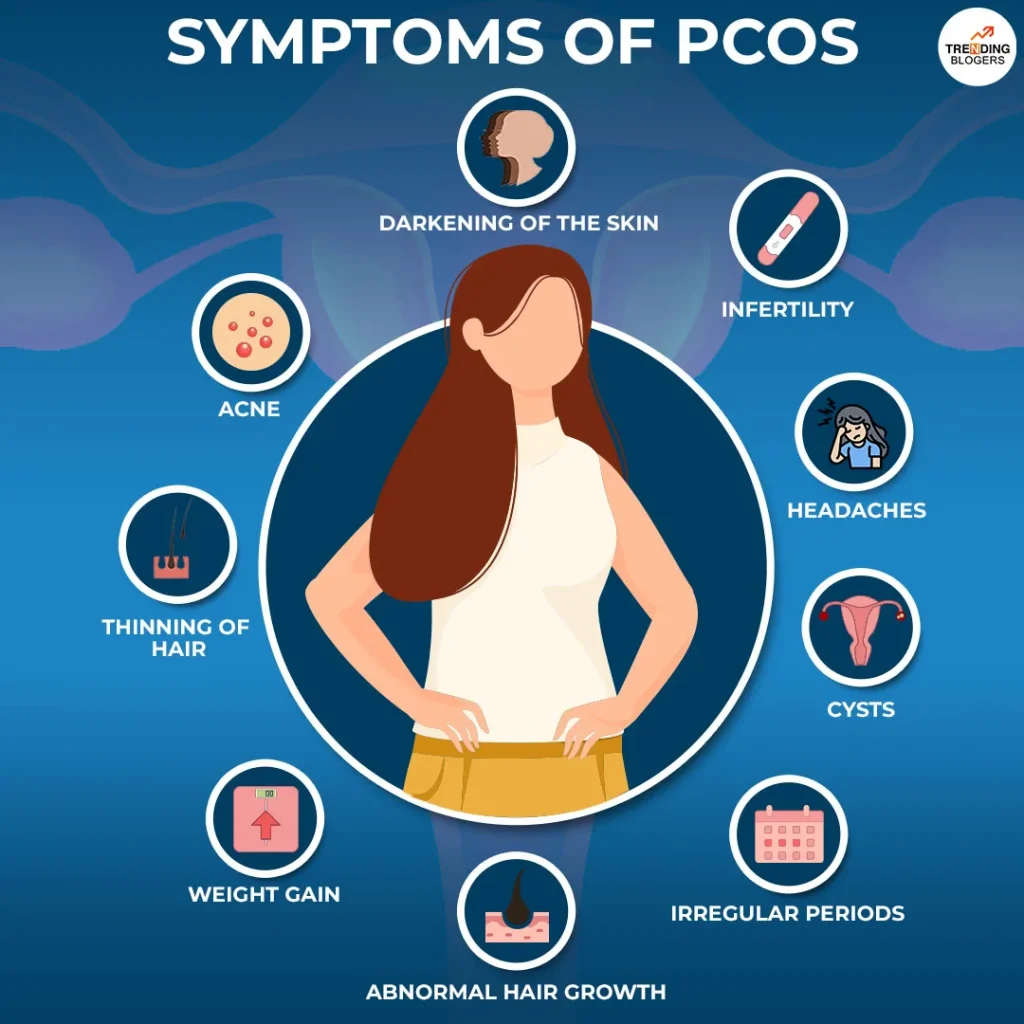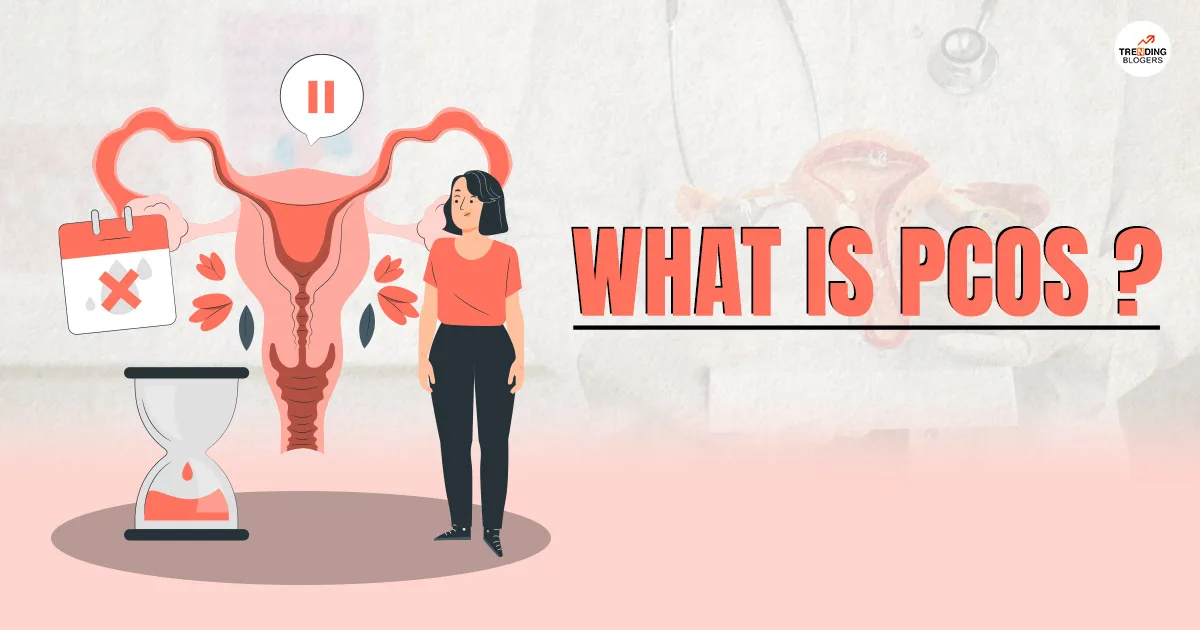Around 26.7 percent of women in the age group of 15 to 44 have PCOS and surprisingly 70% of the women suffering from this don’t even know it.
Polycystic ovarian syndrome or Polycystic ovary syndrome is a health problem that is common in women and girls of reproductive age. An imbalance of reproductive hormones causes it, which leads to problems in the ovaries. The ovaries help the egg that is released every month as part of a healthy menstrual cycle. PCOS restricts the egg from fully developing or may restrict the ovulation process.
Polycystic ovary syndrome can cause missed or irregular periods, and it can lead to:
- Formation of small fluid-filled sacs (cysts) in the ovaries.
- PCOS can even lead to infertility.
Overview Of PCOS
PCOS (polycystic ovary syndrome) is the most usual cause of infertility in females. It affects 5% to 12% of women of reproductive age in the US. However, this is a lifelong condition that continues far beyond the reproductive years.
With PCOS, women are often insulin resistant, meaning their bodies can’t use insulin effectively, which increases the risk for type 2 diabetes. They also have high levels of male hormones (androgens, which females also have).
Androgen restricts the eggs from being ovulated or released. PCOS can cause several issues, including acne, excess hair growth on the body and face, irregular periods, and thinning of scalp hair.
Overweight women can face some serious health issues related to PCOS, including:
- Diabetes
- Heart disease
- Gestational diabetes (diabetes during pregnancy)
- Stroke
- High blood pressure
- Sleep apnea
- Cholesterol
What is the Symptoms Of PCOS?
The common symptoms and signs of PCOS include:
- Infertility: This is the most common cause. Not ovulating frequently and irregularly ovulating can result in not being able to conceive.
- Cysts: In ultrasound, most of the women with PCOS have ovaries that appear with many follicles and are generally larger (egg sac cysts).
- Irregular Periods: Missing or irregular periods is one of the most common signs. It also involves heavy bleeding during periods.
- Abnormal Hair Growth: Women with PCOS may experience heavy hair growth on their abdomen, arms, and chest area.
- Weight Gain: One of the most common signs is obesity. Women with polycystic ovarian syndrome have trouble maintaining a healthy weight.

- Thinning of Hair: Women with PCOS may experience bald patches on their scalp.
- Acne: Common signs of this disease include acne, which can be seen on your face, chest, and back. These acne can be challenging to treat.
- Darkening of the Skin: You may experience dark skin patches, especially in the folding areas like your neck, between the legs, armpits, and under your breasts.
- Headaches: You may experience headaches with PCOS.
What is the Causes of PCOS?
Doctors don’t know the true cause of PCOS, but factors that might play a role include:
- Heredity: According to researchers, PCOS might be linked with family history, and genes might play an important role in this.
- Increased androgen level: The ovaries may produce high-level androgens with PCOS. This means that eggs do not develop regularly and are not released from the follicles where they are developed.
- Insulin Resistance: Insulin is made by the pancreas. Your blood sugar levels can go up if cells become resistant to the action of insulin. More insulin causes your body to make much of the male androgen hormone. It can cause problems with the ovulation process.
- Low-grade inflammation: White blood cells make substances in response to injury and infection, which is called low-grade inflammation. According to researchers, women with PCOS have a type of low-grade, long-term inflammation, leading to Polycystic ovaries developing androgens. This can also lead to blood vessels and heart problems.
How is PCOS Diagnosed?
If you are experiencing any of the symptoms mentioned above, you should definitely consult a doctor. Your doctor will ask you about the signs and medical history.
Also, you may have a physical exam, which will likely include a pelvic examination. This exam will help determine the health of your reproductive organs, both outside and inside your body. Some other tests are given below:
- Blood test: This test will help to determine high-level androgens and other hormones. Also, your doctor may check your blood glucose levels, and it is important to have your triglyceride and cholesterol levels checked.
- Ultrasound: Ultrasound creates images of tissues, organs, and blood vessels with the help of sound waves and a computer. The images help to determine the size of the ovaries and see if it is a cyst. Also, Ultrasound helps to look at the thickness of the lining of the uterus, endometrium.
How to Treat PCOS Problems?
A number of factors affect the treatment of PCOS. These may include your overall health, how serious your symptoms are, and also your age plays a vital role. The treatment also depends on whether you want to conceive or not in the future.
If you don’t plan to conceive, the treatment may include:
- Birth Control Medicines: These pills help to lower androgen levels, control menstrual cycles, and reduce acne.
- Change in Activity and Diet Food: Maintaining a healthy diet and doing activities can help you lose weight and reduce your PCOS symptoms. Also, this will help your body to use insulin efficiently, help you to ovulate, and lower your blood sugar levels.
- Diabetes Pills: These medications help lower insulin resistance, reduce androgen levels, and ovulate more regularly.
- Pills to treat other symptoms: Many medications can also help you to reduce your acne and hair growth.
If you are planning to get pregnant, the treatment may include:
- A change in activity and diet: Managing your schedule efficiently will surely help you to reduce the symptoms of PCOS. more physical activities and a proper diet can help you to gain a healthy weight. Doing these can help you to use your body insulin more effectively, can lower blood sugar levels, and can help you to ovulate.
- Pills to cause ovulation: Pills help the ovaries to release the eggs normally. However, these pills can have some serious risks involved. They can increase the chance of having twins or more. Also, they can cause ovarian hyperstimulation when the ovaries release too many hormones. Additionally, it can cause symptoms like pelvic pain and bloating.
In a Nutshell
PCOS can affect a woman’s menstrual cycle and make it harder for them to get pregnant. High levels of androgen also lead to serious issues like unwanted hair growth on the face and body. However, there are many treatments available that can surely help you to conceive.
Also Read About: Bungee Workout/ Exercise: A Jump Your Way to Fitness




